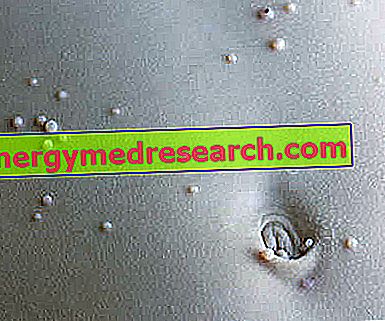Introduction
Nails in pregnancy can undergo different modifications, just like any other part of the body during this phase of a woman's life.

The transformations are completely normal during the gestation period, they affect not only the reproductive system and the breast, but also the hair, the skin, the nails and the entire body. In particular, the changes to the nails can be different from pregnant to pregnant: if to some the pregnancy gives strong nails like never before; to many others it makes them weak and fragile.
Short Review: what are Nails and what are they for?
The nails are located on the dorsal face of the last phalanges of the fingers and toes. They contribute to the manipulative precision (in fact, thanks to them it is possible to handle many small objects), they provide protection at the digital end and give a greater sensitivity to the fingertips thanks to the rich innervation of the nail bed.
Nail changes
Alterations and changes in nails during pregnancy
As mentioned, the alterations that can occur in nails during pregnancy are not the same for all women.
Some pregnant women, thanks to the changes that naturally occur in the body, undergo a clear improvement in their nails that appear more robust and shiny. However, the number of women so fortunate is decidedly lower than those who find themselves having nails that are anything but strong during the nine months of gestation. In fact, in most cases, nails in pregnancy are weakened, become brittle and can become:
- Increased susceptibility to rupture ;
- Exfoliation (lamellar onicoschizia);
- Appearance of white spots (leuconichia).
Did you know that ...
In spite of the fragility that nails can encounter during pregnancy, in this period they tend to grow faster .
Causes
What are the causes of nail changes in pregnancy?
In most cases, the appearance of nail fragility during pregnancy can be considered as a normal phenomenon, due to the hormonal changes that typically occur in this period of a woman's life.
However, in some cases, the alterations affecting the nails could derive from systemic causes or basic pathologies that do not strictly concern the nails, but whose manifestations may also involve these skin appendages. These include:
- Nutritional deficiencies (especially, but not exclusively, vitamins and minerals);
- Metabolic disorders of various types and severity;
- Systemic disorders ;
- Skin disorders (eg, psoriasis, etc.).
Finally, the alterations that occur in nails during pregnancy could also derive from nail diseases properly so called .
Nail Diseases
What diseases can affect nails during pregnancy?
The diseases that can affect nails during pregnancy are the same as those that can affect the nails of non-pregnant women or men. In particular, these skin appendages may undergo:
- Inflammatory processes affecting the nail matrix;
- Inflammation of the perionichio (the area surrounding the nail plate);
- Bacterial infections that can be sustained by Pseudomonas, staphylococcal strains or other bacteria;
- Viral infections sustained, for example, by Herpes simplex ;
- Fungal infections (onychomycosis).
Onychomycoses are perhaps the most common and widespread infections that can affect nails in pregnancy and not. Their treatment usually involves the use of special medicated enamels based on active ingredients with antifungal action . However, given the delicacy of the period, the application of similar drugs on nails during pregnancy should only take place in cases of real need, only on the express indication of the doctor and only under the strict control of the latter.
For more information, also read the dedicated articles: Nail Diseases - Onychomycosis.
Nail Polish and Manicure
Manicure and Nail Polish Application on Pregnant Nails: Yes or No?
Among the many doubts that afflict pregnant women there is also that concerning the use of cosmetic enamels and the execution of manicures during pregnancy.

Manicure, understood as nail care without the use of any type of product (cutting, filing, cuticle care, etc.) can generally be performed without any contraindication; indeed, it can contribute to the maintenance of healthy nails, reducing the risk of breakage and flaking .
On the contrary, the use of cosmetic enamels on nails during gestation is an issue that raises conflicting opinions and opinions .
The "danger" attributed to the use of enamel on pregnant woman's nails is not so much the applied product that remains on the nail surface, but rather the possibility of inhaling the solvents and other volatile substances with which it is formulated. For this reason, the use of nail polish in pregnancy should only take place following certain precautions, such as:
- Be sure to use quality enamels free of toxic and dangerous substances;
- Take care to apply the product in a well ventilated area;
- Avoid biting your nails.
For more information on the use of nail varnish during pregnancy, please read the dedicated article: Enamel in Pregnancy.
Supply
Feeding to Strengthen Nails in Pregnancy
Nutrition plays a very important role in the well-being of nails during pregnancy and beyond. In fact, a healthy and balanced diet contributes to the maintenance of healthy nails even outside of gestation, as well as favoring the maintenance of good health of skin, hair and the entire organism.
However, the foods that can come in handy for nail wellness are those containing the following nutrients:
- Vitamins (in detail, vitamin A, vitamin B6, vitamin C and vitamin E);
- Mineral salts (especially iron, copper, zinc, phosphorus, silicon and calcium);
- Essential sulfur amino acids .
For more information on the most suitable diet to reinforce fragile nails, we recommend reading the dedicated article: Diet and Nails - Foods to Reinforce them.
Please note
The use of so-called nail supplements based on vitamins and other nutrients should not be carried out during pregnancy without prior consultation with the doctor or gynecologist.
Useful Tips
Useful Tips for Nursing in Pregnancy
Below are some useful tips for nail care in pregnancy, whether fragile or not.
- If your nails are fragile, avoid applying any kind of enamels, including semi-permanent ones and so-called "gels" (moreover, the application of this type of enamels would not be ideal even when the nails appear in normal conditions despite the pregnancy ).
- Avoid biting your nails, breaking them or facilitating their eventual disintegration in a voluntary manner. In doing so, in fact, the nail plate becomes thinner, weakening further.
- If your nails are particularly weak, avoid growing them too much.
- Doing a manicure a week or at least periodically, cutting and filing your nails, could be useful to avoid breakage.
- Always use gloves when using detergents (for example, during house cleaning, while doing laundry by hand, when washing dishes, etc.).
- If you really can't renounce the application of cosmetic enamel and if your nails are not fragile, take care to use only high quality products, applying them in well ventilated areas.
- Adopt a healthy and balanced diet.
Please note
Although in most cases the fragility of nails during pregnancy is a phenomenon considered normal, since the alterations affecting these skin appendages could be signs of systemic problems or pathologies (for example, nutritional deficiencies, pathologies of the metabolism, etc.). ), referral to a doctor is always advisable .
However, when nail changes in pregnancy are not related to diseases or other conditions, but are caused by the pregnancy itself, they should return to normal conditions after giving birth, in a more or less wide time span variable from woman to woman.



